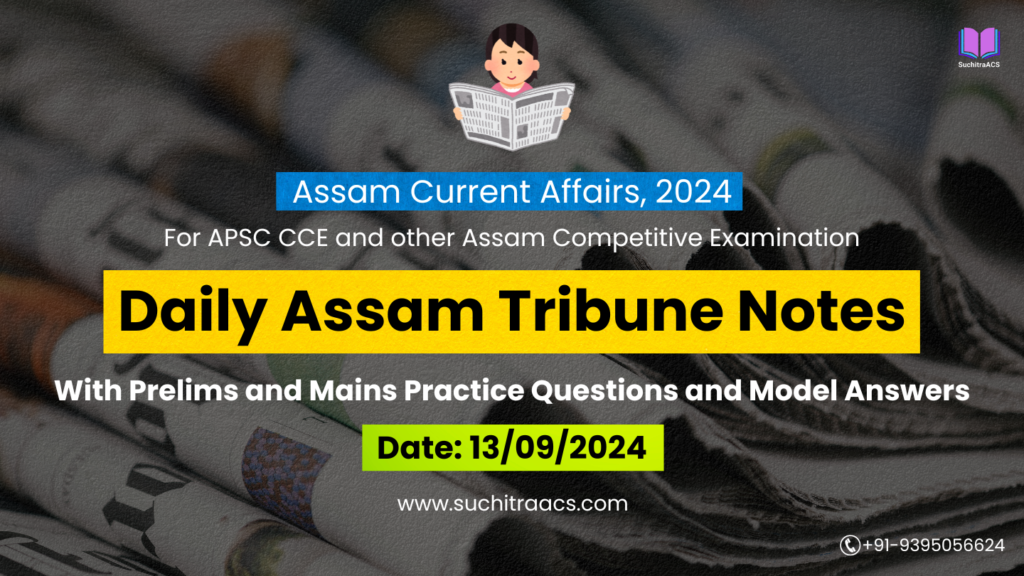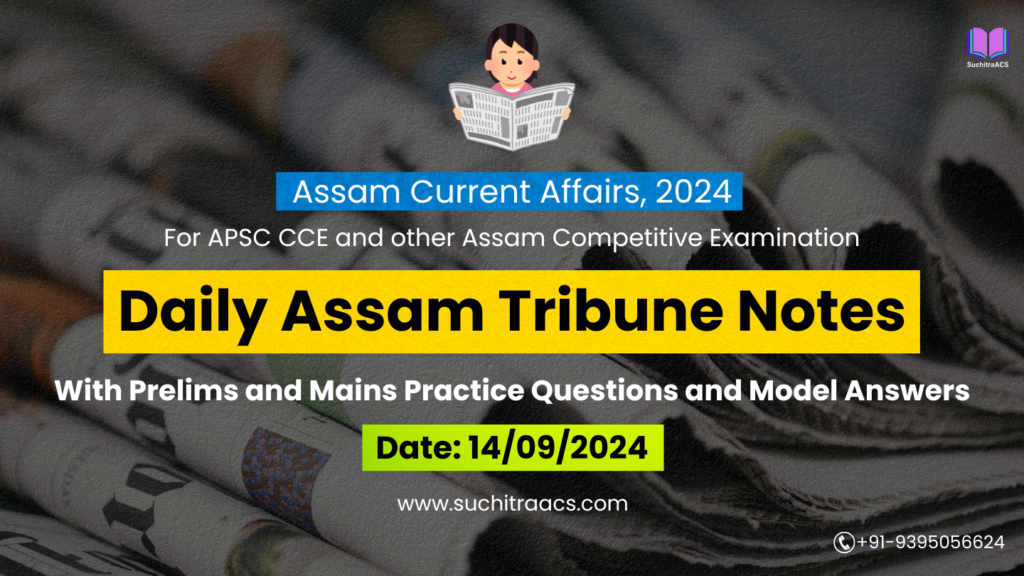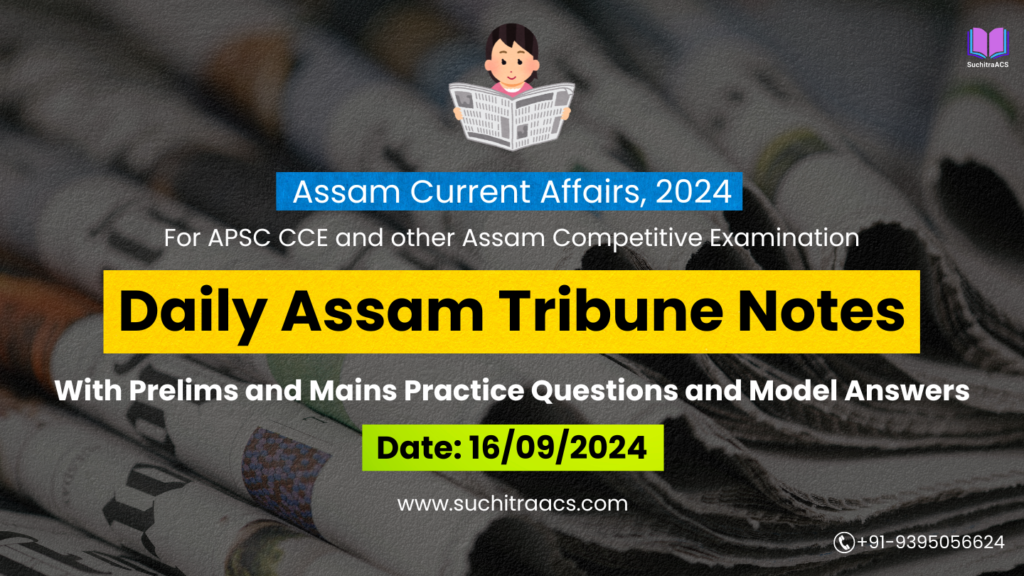APSC Current Affairs: Assam Tribune Notes with MCQs and Answer Writing (08/10/2024)
For APSC CCE and other Assam Competitive examinations aspirants, staying updated with current affairs is vital. This blog covers most important topics from the Assam Tribune today (08-10-2024). These issues are key for both APSC Prelims and Mains preparation, offering insights into the APSC CCE Syllabus.
1. Soil Health Cards Distribution in Assam
GS Paper III – Agriculture, Economic Development
Introduction:
Chief Minister Himanta Biswa Sarma launched the distribution of Soil Health Cards (SHC) to farmers across Assam, alongside the distribution of farm machinery and the inauguration of agriculture knowledge centers. The initiative aims to improve the quality of soil and agricultural output.
Key Points:
- Soil Health Cards (SHC):
- SHCs provide information on nutrient status and health of soil to assist farmers in managing soil fertility efficiently.
- The government targets to distribute 10 lakh SHCs across the state, with 4 lakh already distributed.
- Laboratories:
- The number of soil testing laboratories in Assam has been increased from 5 to 22 to facilitate accurate soil analysis.
- Farm Machinery Banks:
- The government plans to establish 816 village-level farm machinery banks with a 95% subsidy from the central government.
Prelims Focus:
- Soil Health Card Scheme: Objectives, implementation, and benefits to farmers.
- Role of soil testing laboratories and SHCs in improving agricultural productivity.
Mains Focus:
- Impact of SHCs: How they can help farmers optimize their use of fertilizers and improve crop yield.
- Sustainability: The importance of SHCs in promoting sustainable agriculture by maintaining soil health.
- Challenges: The challenges of reaching farmers in remote areas and ensuring widespread usage of SHCs for better agricultural management.
Conclusion:
The distribution of Soil Health Cards is a significant step towards promoting sustainable agriculture in Assam. By ensuring farmers are aware of the nutrient status of their soil, the initiative will help in improving crop yields and maintaining soil health in the long run.
2. Assam’s Employment Generation Target
GS Paper II – Governance, Employment
Introduction:
Chief Minister Himanta Biswa Sarma has set an ambitious target of generating 1.7 lakh government jobs by 2026. This comes after the successful recruitment of over 1.25 lakh employees in various government departments since the state government took office.
Key Points:
- Current Recruitment:
- So far, 385 appointment letters were issued across various departments such as higher education, technical education, and health services.
- The government has planned to recruit 35,000–40,000 candidates by May 2025 under the Assam Direct Recruitment Examination (ADRE).
- Focus on Youth Employment:
- The state government is focusing on providing job opportunities for the youth as the average age in Assam is 22.7 years, indicating a large young population eager for employment.
- Future Recruitment:
- Additional appointments will be made in Assam Police and the Education Department to meet the employment target.
Prelims Focus:
- Assam Direct Recruitment Examination (ADRE): Key points and recruitment statistics.
- Assam government’s initiatives in youth employment.
Mains Focus:
- Employment Generation: The role of government recruitment drives in tackling unemployment in Assam.
- Youth Empowerment: How creating employment avenues for young people contributes to the state’s overall development.
- Challenges: Balancing the creation of government jobs with ensuring economic sustainability and preventing job saturation in public sectors.
Conclusion:
The Assam government’s goal of creating 1.7 lakh government jobs is a positive move towards tackling unemployment and providing economic stability for young people. However, there must also be efforts to create opportunities in the private sector for long-term sustainability.
3. India-Maldives Relations
GS Paper II – International Relations
Introduction:
India and the Maldives strengthened their bilateral relations by signing a currency swap agreement and launching new infrastructure projects. The two countries aim to enhance economic and maritime security cooperation.
Key Points:
- Currency Swap Agreement:
- India extended a USD 400 million currency swap pact to help the Maldives tackle its financial crisis.
- Infrastructure Development:
- India will assist in building ports, airports, and housing projects in the Maldives, including the development of a new commercial port at Thilafushi Island.
- RuPay Card Launch:
- The launch of the RuPay card in the Maldives aims to enhance financial transactions between the two nations.
Prelims Focus:
- Key agreements between India and Maldives, including the currency swap pact.
- Infrastructure projects led by India in the Maldives.
Mains Focus:
- Economic Cooperation: The role of India’s assistance in stabilizing the Maldives’ economy and strengthening bilateral ties.
- Maritime Security: How maritime security cooperation can help safeguard the Indian Ocean region.
- Challenges: Maintaining diplomatic relations while navigating the Maldives’ geopolitical alignment with other global powers like China.
Conclusion:
India’s growing partnership with the Maldives reflects its strategy of deepening economic and maritime security cooperation in the Indian Ocean region. This relationship not only benefits the Maldives but also bolsters India’s strategic position in the region.
Based on the Assam Tribune (October 8, 2024) newspaper, here are comprehensive notes aligned with the APSC CCE syllabus:
4. International Girl Child Day Observed in Assam
GS Paper II – Social Justice, Women Empowerment
Introduction:
International Girl Child Day was celebrated across Assam under the Beti Padhao, Beti Bachao initiative. The event focused on empowering girl children through education and health awareness, with multiple activities aimed at improving their social standing.
Key Points:
- Awareness Campaigns:
- Various programs were conducted to raise awareness about sanitary health, career counseling, and educational rights for girls.
- The event involved sanitary pad distribution, career counseling sessions, and plantation drives.
- Education and Health:
- The campaign emphasized the importance of education and health for girls, particularly in rural areas, to ensure a brighter future for them.
Prelims Focus:
- Key schemes like Beti Bachao, Beti Padhao.
- Importance of sanitary health education and career counseling for girls.
Mains Focus:
- Impact on Girls’ Education: How such initiatives help in preventing school dropouts and child marriages.
- Health and Sanitation: Providing sanitary health education empowers girls to manage menstrual health effectively, reducing health risks.
- Challenges:
- Reaching out to girls in remote areas.
- Changing the mindset of communities regarding girls’ education and health.
- Suggestions:
- Increase participation from local communities to spread awareness in rural areas.
Conclusion:
Celebrating International Girl Child Day in Assam under the Beti Bachao, Beti Padhao initiative is a positive step towards improving the lives of girl children. Continuous efforts are needed to ensure that every girl child has access to quality education and healthcare.
APSC Prelims Practice Questions
1. What is the main objective of the Soil Health Cards (SHC) distributed in Assam?
(a) To increase soil testing laboratories in urban areas
(b) To provide information on soil nutrient status to help farmers manage soil fertility
(c) To offer financial assistance to farmers for purchasing fertilizers
(d) To replace traditional farming methods with modern agricultural technologies
Answer: (b) To provide information on soil nutrient status to help farmers manage soil fertility
Explanation:
The Soil Health Cards (SHC) provide farmers with detailed information on the nutrient status and health of the soil to help them manage soil fertility and improve agricultural output.
2. Which of the following statements is correct regarding the farm machinery banks to be established in Assam?
(a) The government will provide a 50% subsidy for the farm machinery
(b) 816 village-level farm machinery banks will be established with a 95% subsidy
(c) Only large commercial farmers will have access to the farm machinery banks
(d) The farm machinery banks will only focus on distributing fertilizers and pesticides
Answer: (b) 816 village-level farm machinery banks will be established with a 95% subsidy
Explanation:
The Assam government plans to establish 816 village-level farm machinery banks with a 95% subsidy from the central government, aiming to make advanced machinery accessible to farmers.
3. The Assam government plans to generate how many government jobs by 2026?
(a) 1.25 lakh
(b) 1.5 lakh
(c) 1.7 lakh
(d) 2 lakh
Answer: (c) 1.7 lakh
Explanation:
The Assam government has set a target to generate 1.7 lakh government jobs by 2026 to address unemployment and provide economic stability.
4. Which of the following infrastructure projects is NOT mentioned as part of India’s development assistance to the Maldives?
(a) Development of commercial port at Thilafushi Island
(b) Construction of highways connecting key cities
(c) Building of ports and airports
(d) Construction of housing projects
Answer: (b) Construction of highways connecting key cities
Explanation:
India’s development assistance to the Maldives includes ports, airports, and housing projects, but the construction of highways is not mentioned as part of the agreement.
5. What was the focus of the International Girl Child Day event in Assam, observed under the Beti Bachao, Beti Padhao initiative?
(a) Financial literacy for girls
(b) Empowering girls through education and health awareness
(c) Providing vocational training to girl children
(d) Promoting entrepreneurship among young girls
Answer: (b) Empowering girls through education and health awareness
Explanation:
The International Girl Child Day event in Assam focused on empowering girl children through education and health awareness, including campaigns on sanitary health and career counseling.
APSC Mains Practice Question
Question:
Discuss the impact of the Nijut Moina Scheme on the education of girl students in Assam. What are the challenges in its implementation, and how can these be addressed?
(Answer in 250 words)
Model Answer:
Introduction:
The Nijut Moina Scheme, launched by the Assam Government, aims to provide financial assistance to girl students from higher secondary (HS) to postgraduate (PG) levels. This scheme seeks to encourage girls to pursue education, prevent child marriage, and promote social empowerment.
Impact on Education:
- Financial Support: The scheme offers ₹10,000 annually to HS students, ₹12,500 to graduate students, and ₹25,000 to PG students. This reduces the financial burden on families, encouraging them to prioritize education for their daughters.
- Prevention of Child Marriage: The scheme mandates that the beneficiary must remain unmarried until the PG level, contributing to the reduction of child marriage in the state.
- Increase in Enrollment: By financially supporting girl students, the scheme increases enrollment rates at the higher education level, particularly for those from underprivileged backgrounds.
- Gender Equality: It promotes gender equality by empowering young women to become economically independent and educated, enhancing their opportunities in the workforce.
Challenges:
- Implementation in Remote Areas: Ensuring smooth implementation in rural and remote areas, where access to education and monitoring mechanisms may be limited.
- Misuse of Funds: There is a risk of corruption and misuse of funds during disbursement.
- Awareness: Many eligible families may not be aware of the scheme’s benefits or face challenges in completing the necessary documentation.
Suggestions:
- Strengthening Awareness Campaigns: Launch awareness programs in rural areas to ensure families are informed about the scheme.
- Efficient Monitoring: Implement a robust monitoring system to track the beneficiaries and ensure transparency in fund distribution.
- Partnerships with Local NGOs: Partner with local NGOs to help with outreach, ensuring the scheme reaches the most marginalized communities.
Conclusion:
The Nijut Moina Scheme has the potential to transform the educational landscape for girls in Assam. By addressing challenges in implementation and ensuring broad outreach, it can significantly contribute to gender equality and social upliftment in the state.
✨ Looking for top-quality APSC online coaching at an affordable price?

🔔 Join Our WhatsApp Study Group!
For exclusive access to premium quality content, including study materials, current affairs, MCQs, and model answers for APSC CCE and other Assam competitive exams.
Click here to join: SuchitraACS Study WhatsApp Group
📚 Want to know more about SuchitraACS’s most affordable courses?
Click here to know more: SuchitraACS Courses for APSC CCE and Assam Competitive Examinations




